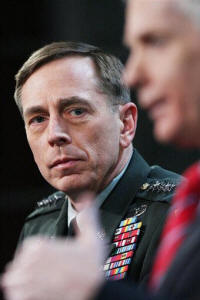|
 Top Iraq generals defend pause in troop reductions Top Iraq generals defend pause in troop reductions
 Send a link to a friend
Send a link to a friend
[May 22, 2008]
WASHINGTON (AP) --
The U.S. must be careful not to withdraw forces from Iraq too quickly because security gains could be lost, warn the nation's top two war generals.
The position of Gen. David Petraeus, nominated to assume control of U.S. forces in the Middle East, and Lt. Gen. Raymond Odierno, picked to replace Petraeus as the top commander in Iraq, all but guarantees that some 140,000 troops will be committed in Iraq for the remainder of the year.
The nominations, if approved by the Senate as expected, would keep the administration on its present course in Iraq and hand the next administration a pair of combat-tested commanders who have relentlessly defended President Bush's decision last year to build up troop levels rather than wind down the war.
|
|
 "There is no simple metric or calculation that can give us a green or red light on further reductions," wrote Odierno in a lengthy question-and-answer document submitted to the panel in advance of a hearing scheduled Thursday before the Senate. "There is no simple metric or calculation that can give us a green or red light on further reductions," wrote Odierno in a lengthy question-and-answer document submitted to the panel in advance of a hearing scheduled Thursday before the Senate.
Various factors will be considered, but "I will rely most heavily on my subordinate commanders' recommendations and my own independent judgment," he added.
The two Army generals were set to testify before the Senate Armed Services Committee, giving Democrats a chance to sharply question them on when more troops might come home and whether the U.S. war effort in Iraq has aggravated the violence there.

Last year, both generals were integral in crafting and implementing Bush's new military strategy in Iraq, which included the deployment of 30,000 additional troops.
Petraeus has recommended, and Bush has agreed, to withdraw the extra troops by July but to halt further reductions after that. Petraeus has said he needs a 45-day period of evaluation and then an indefinite period of assessment before he would recommend any further pullouts.
In his response to the committee, Petraeus reports that violence in Iraq last week was at its lowest levels in a month with trend lines indicating that security has improved.
"Having noted that, progress is uneven and difficult challenges remain" including meddling by Iran and continued attacks by al-Qaida and sectarian militants, Petraeus wrote.
But, he later added, "we have seen more unity across sectarian lines at the national level, and this presents opportunities for further progress."
[to top of second column] |
 Petraeus was picked to replace Navy Adm. William J. Fallon as chief of U.S. Central Command in Tampa, Fla. The command's area of responsibility includes some of the most troubling hot spots: Iraq, Iran, Pakistan, Lebanon, parts of Africa and Afghanistan.
Fallon resigned last month, saying news reports that he was at odds with the White House over Iran policy had become a distraction.
Odierno spent 15 months as Petraeus' top deputy before being nominated as the top commander in Iraq.
Presidential campaign politics will likely be on display Thursday with Sen. Hillary Rodham Clinton as a panel member. Sen. John McCain of Arizona, the top Republican on the committee, is expected to miss the hearing because he is in California.
[Associated
Press; By ANNE FLAHERTY]
Copyright 2008 The Associated
Press. All rights reserved. This material may not be published,
broadcast, rewritten or redistributed.
 |